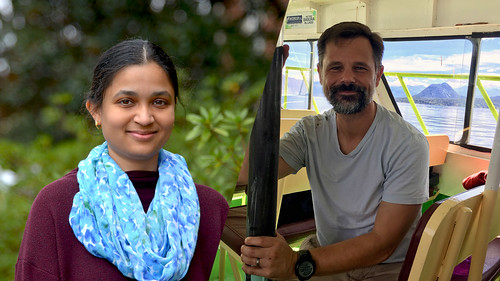Two Auburn College of Agriculture faculty members receive NSF Early Career awards totaling more than $1.4 million
Article body
For the first time in the history of Auburn’s College of Agriculture, two faculty members have been selected for the prestigious National Science Foundation Faculty Early Career Development, or CAREER, program within the same year.
The CAREER Program is a foundation-wide activity that offers the National Science Foundation's most prestigious awards in support of early-career faculty who have the potential to serve as academic role models in research and education and to lead advances in the mission of their department or organization.
Matthew Waters is an assistant professor of environmental science in the college’s Department of Crop, Soil and Environmental Sciences. Waters leads the Auburn PaleoEnvironmental Lab where he and his team of researchers reconstruct historic data recorded in lake sediments and cave environments to document ecological change throughout time.
His research projects focus on the land-water connections resulting from human and other environmental impacts and how these changes alter aquatic ecosystems. He has studied lake ecosystems throughout the southeastern United States and Latin America.
Waters’ $639,971 CAREER project will focus on the historic occurrence of a group of toxins, cyanotoxins, associated with modern harmful algal blooms. Sample sites will span from North Carolina to Mexico, where Waters and his team will reconstruct harmful algal blooms throughout the last 5,000 years.
The ultimate outcome of the project is to predict cyanotoxin outbreaks as well as determine if ancient societies like the Maya of Mesoamerica experienced harmful algal blooms similar to today’s societies.
Neha Potnis is an assistant professor in the college’s Department of Entomology and Plant Pathology. Her research program is focused on exploring the dynamics of the host-pathogens arms race by studying interactions of pathogens with the resident microflora, the environment and the host.
Her overall goal is to develop mechanistic understanding of how pathogen responds to this dynamic environment and leverage this knowledge for proposing novel disease management strategies or altering the current strategies to control old and new disease outbreaks.
Potnis’ $849,698 CAREER project will focus on two goals: to understand various mechanisms that diverse pathogenic bacteria use to specialize on a common host and to identify traits that allow pathogenic bacteria to acquire infectivity on a new host.
This knowledge will increase the understanding of what makes bacterium pathogenic and how pathogens can manage to shift to a new host and cause disease outbreaks in agroecosystems.
The educational goals include fostering STEM research interests by providing research opportunities for high school students from high-need schools in Alabama and first-generation minority undergraduate students, and raising public knowledge of emergence of plant disease outbreaks, their influence on plant health and, ultimately, on human lives.
“The College of Agriculture is proud of the work conducted by Dr. Potnis and Dr. Waters,” said Paul Patterson, dean of the College of Agriculture and director of the Alabama Agricultural Experiment Station. “I am very pleased to see them recognized by NSF with this distinction. This is an important career milestone for each researcher.”
Related Media
Media interested in this story can contact Communications Director Preston Sparks at (334) 844-9999 or preston.sparks@auburn.edu.
Auburn University is a nationally ranked land grant institution recognized for its commitment to world-class scholarship, interdisciplinary research with an elite, top-tier Carnegie R1 classification, life-changing outreach with Carnegie’s Community Engagement designation and an undergraduate education experience second to none. Auburn is home to more than 30,000 students, and its faculty and research partners collaborate to develop and deliver meaningful scholarship, science and technology-based advancements that meet pressing regional, national and global needs. Auburn’s commitment to active student engagement, professional success and public/private partnership drives a growing reputation for outreach and extension that delivers broad economic, health and societal impact.





